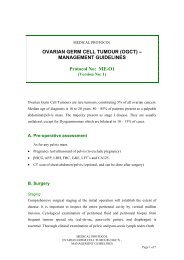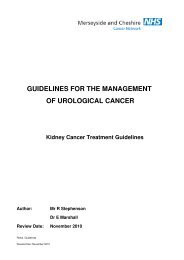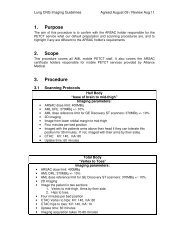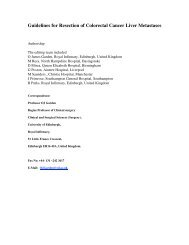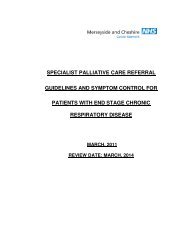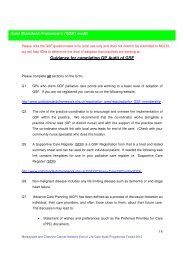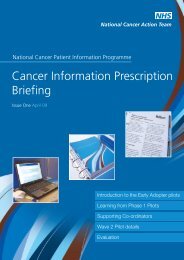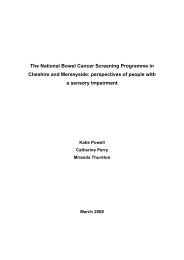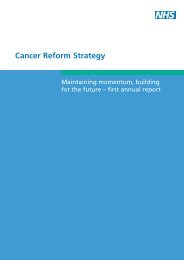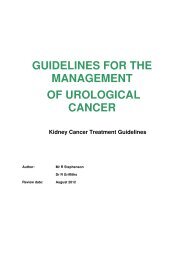Cancer Reform Strategy - NHS Cancer Screening Programmes
Cancer Reform Strategy - NHS Cancer Screening Programmes
Cancer Reform Strategy - NHS Cancer Screening Programmes
- No tags were found...
Create successful ePaper yourself
Turn your PDF publications into a flip-book with our unique Google optimized e-Paper software.
CHAPTER 4: ENSURING BETTER TREATMENT 59common for definitive surgery not to be the firstprocedure.4.15 Under the new extension to the 31 daystandard <strong>NHS</strong> Trusts will need to ensure thatpatients undergoing definitive surgery as asecond or subsequent treatment do notexperience delays.4.16 Overall demand for cancer surgery is likelyto rise based on current trends, although thepattern varies between cancer types. Figure 7shows trends in activity related to different typesof surgery, based on data from Hospital EpisodeStatistics.4.17 The quality of cancer surgery has improvedand will continue to improve. More patients arebeing treated by specialist surgeons who gainexpertise in particular procedures, such asoesophagectomy and prostatectomy and there isgood evidence that this is leading to improvedoutcomes.Laparoscopic surgery forcolorectal cancer4.18 Over the next five to ten years we canexpect to see more widespread use of minimallyinvasive surgical techniques for cancer, includinglaparoscopic (keyhole) surgery and possiblyrobotic surgery for some cancers. The lessinvasive techniques should lead to lowermorbidity and speedier recovery for patients aswell as cost savings for the <strong>NHS</strong> due to reducedinpatient days, which could be reinvested toimprove patient care further.4.19 Laparoscopic surgery for colorectal cancerhas been approved by NICE, but is not widelyavailable as only around five to ten percent ofsurgeons have been trained to use thistechnology. Patients cannot therefore always beoffered this option and the benefit in terms ofmore rapid recovery that can go with it. Costs ofstandard and laparoscopic surgery are broadlysimilar.4.20 NICE made clear that laparoscopiccolorectal surgery should only be performed bysurgeons who had completed appropriatetraining in the technique and who performedthe technique often enough to maintaincompetence. To increase the use of this formof surgery, a pilot training programme forlaparoscopic surgery will therefore beestablished which will be fully evaluatedfor potential national rollout. Furtherinformation on this is in chapter 11.4.21 Positive NICE appraisals are usually coveredby a three month funding direction which placesan obligation on PCTs to fund the servicerecommended in order to make it “normallyavailable” within three months. However, awaiver to the funding direction for laparoscopicsurgery for colorectal cancer was issued by theDepartment of Health on 31 October 2006, togive the <strong>NHS</strong> sufficient time to build up thenecessary expertise. This waiver will be liftedin due course, so it will be important thatthe <strong>NHS</strong> prepares for the introduction ofthis technique locally. Trusts will need to:Box 13: Specialist surgery for oesophageal cancerOesophagectomies (an operation to remove the ‘food pipe’) and oesophagogastrectomies(to remove both the food pipe and the stomach) are two examples of cancer surgery that areincreasingly done by specialists.In 1997/98, 309 surgeons in 147 Trusts carried out these operations. By 2004/05, they wereconcentrated in the hands of only 188 surgeons in 96 Trusts.The impact of this has been significant – the number of patients that died in hospital followingone of these operations almost halved in this period (from 9.4% to 4.9%).Although there will be a number of factors that contributed to this, one is specialisation bysurgeons and their teams.



